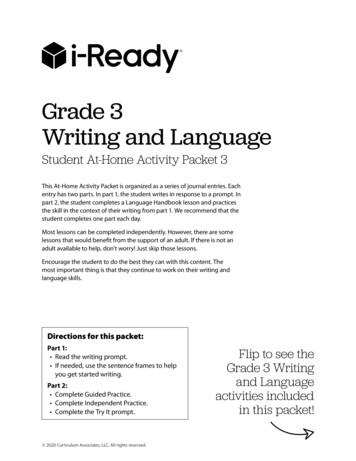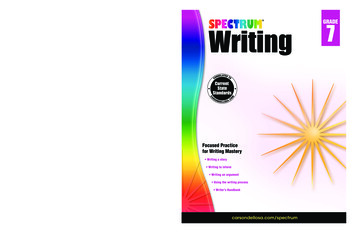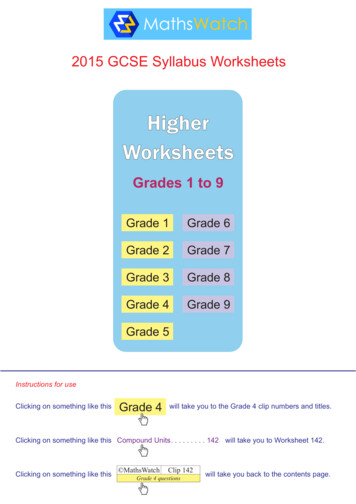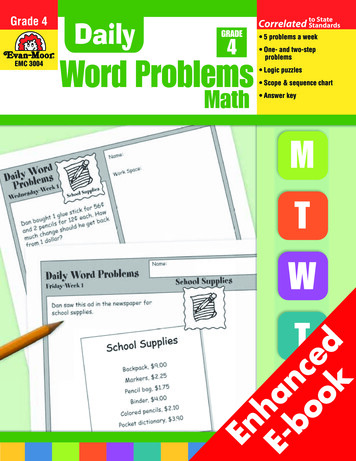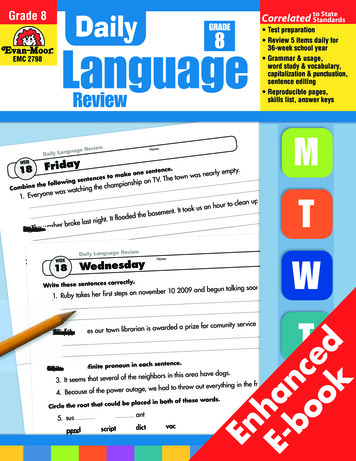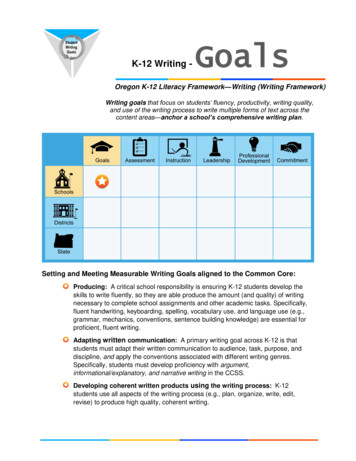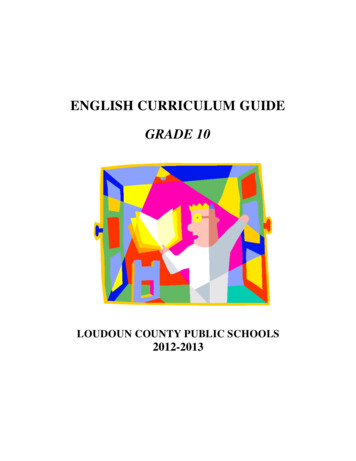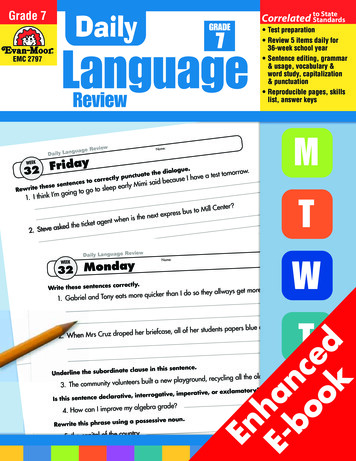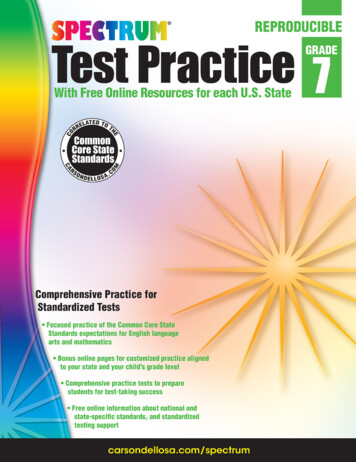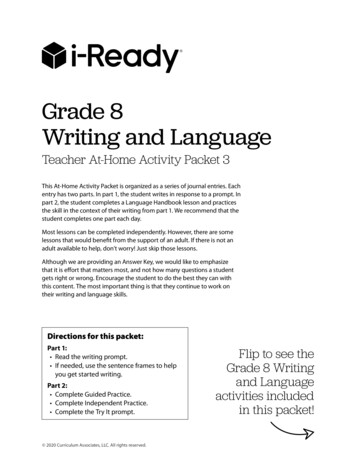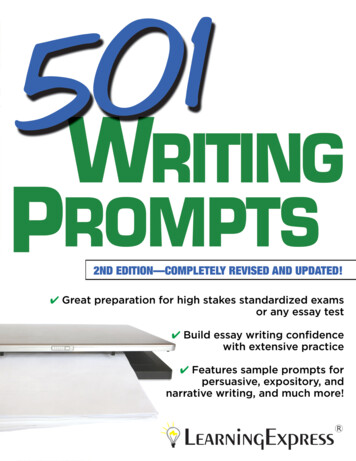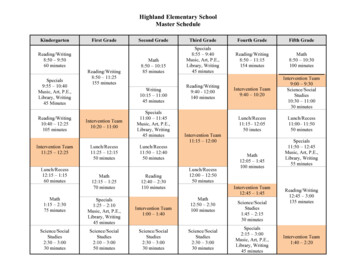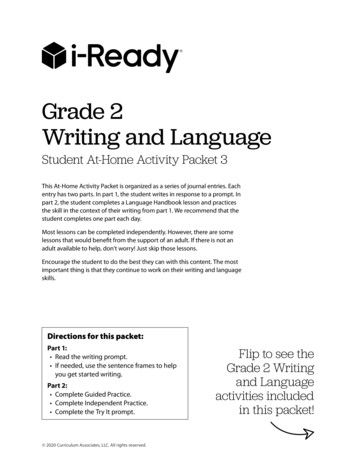
Transcription
Grade 2Writing and LanguageStudent At-Home Activity Packet 3This At-Home Activity Packet is organized as a series of journal entries. Eachentry has two parts. In part 1, the student writes in response to a prompt. Inpart 2, the student completes a Language Handbook lesson and practicesthe skill in the context of their writing from part 1. We recommend that thestudent completes one part each day.Most lessons can be completed independently. However, there are somelessons that would benefit from the support of an adult. If there is not anadult available to help, don’t worry! Just skip those lessons.Encourage the student to do the best they can with this content. The mostimportant thing is that they continue to work on their writing and languageskills.Directions for this packet:Part 1: Read the writing prompt. If needed, use the sentence frames to helpyou get started writing.Part 2: Complete Guided Practice. Complete Independent Practice. Complete the Try It prompt. 2020 Curriculum Associates, LLC. All rights reserved.Flip to see theGrade 2 Writingand Languageactivities includedin this packet!
Table of ContentsGrade 2 Writing and Language ActivitiesEntry1Writing PromptPart 1ResourcePage7Part 2Grade 2 Ready Language HandbookLesson 20Root WordsJournal Entry 1PART 1Lesson 20#X.#.#:LessonRootWordsTitleCommunity helpers help people during emergencies. Name a community helperthat has helped you. It might even be a neighbor. Tell what that person has doneto help you.Introduction Some words can be broken into parts. The main part of the wordis called a root word. The root word will help you figure out the meaning of thewhole word.For example, to help means to make it easier for someone to do something.helpAnn will help us learn about weather.helperShe is a great helper.helpfulShe is a very helpful person.helpingShe is helping us learn about clouds.Guided Practice2 Clouds give useful hintsgetting darkabout weather.3 Puffy clouds mean thehelpfulday will be nice.4 Darkening clouds meanOne time helped me by 2people who look atsomethingclouds.has an ending suchas -er or -y, coverthe ending withyour finger, andread the smallerword. Think aboutwhat that wordmeans. 2020 Curriculum Associates, LLC. All rights reserved.Circle the root word in each underlined word. Then draw a linefrom the sentence to the meaning of the word.1 Weather watchers studyHINT If a wordsoft and lightit might rain.7Grade 2 Packet 3, Entry 1Part 1438Language Handbook Lesson 20 Root Words Curriculum Associates, LLCCopying is not permitted.10Part 2Grade 2 Ready Language HandbookLesson 21Compound WordsJournal Entry 2PART 1Lesson 21#X.#.#:Lesson TitleWordsCompoundThey say April showers bring May flowers. If you were to go on a walk aroundyour neighborhood, what might you see in springtime?Introduction A word that is made up of two smaller words is calleda compound word.Often you can figure out what a compound word means by thinking about themeanings of the two smaller words.house1fly5 houseflyA housefly is a fly that gets into your house.Guided PracticeHINT Sometimesthe second word inthe compound wordis a big clue to theword’s meaning.For example,a “doghouse” isa house for a dog,not a dog that lookslike a house.Put the two words together to make a compound word. Writethe new word on the line. Then circle the correct meaning.1 blackbird5a black feather shaped like a bird2 sword1fish5a sword shaped like a fisha fish with a jaw like a sword3 rattleIn springtime, I see 1a bird with black feathers1snake5a rattle shaped like a snakea snake with a tail like a rattle 2020 Curriculum Associates, LLC. All rights reserved.Grade 2 Packet 3, Entry 210440Language Handbook Lesson 21 Compound Words Curriculum Associates, LLCCopying is not permitted. 2020 Curriculum Associates, LLC. All rights reserved.Grade 2 Packet 32
Table of ContentsGrade 2 Writing and Language Activities (Cont.)Entry3Writing PromptPart 1ResourcePage13Part 2Grade 2 Ready Language HandbookLesson 17Comparing Formal and Informal Uses of EnglishJournal Entry 3PART 1Lesson 17#X.#.#:ComparingLessonTitleFormal andInformal Uses of EnglishWrite a text to a friend or family member. Tell them what you have been doinglately. Then write an email to your teachers. Tell them what you have beenreading about or studying lately.Introduction The words we use when we speak or write depend on whom weare speaking or writing to.Text: We use “everyday” English with our friends and family. For example, we useshort words and phrases called slang and contractions.Hi! What’s up?I’m going to a movie. Can’t wait! We use formal English with people we do not know well, or when we are inschool. We use complete sentences and avoid slang and contractions.Hello, Mr. Chang. How are you?I am looking forward to the movie about pandas.Everyday Englishyeahcan’tThanks a lot!Sorry about that.All done!Email:Guided PracticeHINT Don’t isa contraction of“Do not.” That’s isa contraction of“That is.”Text: I’ve been Email: I have been 2020 Curriculum Associates, LLC. All rights reserved.4Grade 2 Packet 3, Entry 313Part 1432Formal EnglishyescannotThank you very much!I apologize for my mistake.I am finished.Read each example of everyday English. Next to it, write theletter of the formal way to say it.1 I don’t get it.a Yes, that is correct.2 Best book ever!b How are you today?3 How’s it going?c I do not understand.4 Yup, that’s right.d I liked this book very much.Language Handbook Lesson 17 Comparing Formal and Informal Uses of English Curriculum Associates, LLCCopying is not permitted.16Part 2Grade 2 Ready Language HandbookLesson 19PrefixesJournal Entry 4PART 1Lesson #19X.#.#:Lesson TitlePrefixesThe dog just ate your homework! Oh no! Now you will need to redo it! Write ascene for a play. You are the main character. You are telling someone about thisunlucky event. Be sure to tell this person how you feel and what you will need todo to get your homework done.IntroductionYou can use word parts to figure out what a word means.A prefix is a word part added to the beginning of a word. It changes the meaning ofthe word.Prefix Meaning Prefix 1 Wordun“not”un 1 fairre“again”re 1 tellpre“before”pre 1 payGuided PracticeHINT When yousee a long wordwith a prefix, firstlook for a word youknow in it. Thencover that wordwith your fingerand look at theprefix. Think aboutwhat the prefixmeans and add themeaning to theword you know.happy againGrade 2 Packet 3, Entry 4not happy2 We will rebuild it.build againnot build3 The roof is broken and unsafe.not safesafe again4 This time we will preplan how to build it.plan before5 We buy precut boards for the walls and roof.cut before 2020 Curriculum Associates, LLC. All rights reserved.Meaningnot fairtell againpay before1 Dad and I are unhappy with our tree fort.not planI feel about my homework.I will need to New WordunfairretellprepayLook at the prefix in each underlined word. Then circle thecorrect meaning of the word.16436Language Handbook Lesson 19 Prefixesnot cut Curriculum Associates, LLCCopying is not permitted. 2020 Curriculum Associates, LLC. All rights reserved.Grade 2 Packet 33
Table of ContentsGrade 2 Writing and Language Activities (Cont.)Entry5Writing PromptPart 1ResourcePage19Part 2Grade 2 Ready Language HandbookLesson 7Past Tense of Irregular VerbsJournal Entry 5PART 1Lesson 7#X.#.#:LessonPastTenseTitleof Irregular VerbsYesterday you woke up and discovered that you were the size of an ant. What didyou do? How did you feel? Today you are back to your normal size. Write aboutthe day you had yesterday and all that you did.Introduction A verb tells what someone or something does or is.A past-tense verb shows an action that happened in the past. The letters -ed at the end of a verb show an action that happened in the past.Today, I walk to the pool. Yesterday, I walked to the pool. Some verbs are irregular. They change in special ways to show an action thathappened in the past. You just have to remember these.Today, I go to the pool. Yesterday, I went to the pool.NowIn the PastsitsatGuided Practicecomecamegetgot1 Last week, IHINT Use thechart to find thecorrect spelling ofeach irregularpast-tense verb.2 We5 We619Grade 2 Packet 3, Entry 5Part 1412Aldo at the pool.into the water.4 Aldo 2020 Curriculum Associates, LLC. All rights reserved.telltoldby the side of the pool.3 Then weYesterday I was thesize of an ant and I seesawrunranCircle the correct past-tense verb to complete each sentence.me he was cold.out of the cold water.Language Handbook Lesson 7 Past Tense of Irregular Verbsseessawsatsitsjumpsjumpedtoldtelledgettedgot Curriculum Associates, LLCCopying is not permitted.22Part 2Grade 2 Ready Language HandbookLesson 9Complete SentencesJournal Entry 6PART 1Lesson 9#Lesson TitleCompleteSentencesYou get to share directions for making something with your classmates on theclass Facebook page. Write directions for making a healthy snack, creating a funcraft, or building a cool fort out of things you have at home.IntroductionX.#.#:A sentence is a group of words that tells a complete thought. Every sentence has a subject.The subject names the person orthing that the sentence is about.subjectThe children play in the park. Every sentence has a predicate.The predicate tells what the subjectdoes or is.predicateThey love the big playground. A sentence begins with a capital letter. It ends with a period.Guided PracticeRead each sentence. Above the underlined words, write “S” for“Subject” or “P” for “Predicate.”HINT The subject1 The kids run on the playground.can name morethan one personor thing.2 Gracie goes down the slide.3 Two children swing from the bars.First, you 4 Mom and Uncle Ray sit on a bench.Then you Last, you 2020 Curriculum Associates, LLC. All rights reserved.Grade 2 Packet 3, Entry 65 A black dog runs across the playground.22416Language Handbook Lesson 9 Complete Sentences Curriculum Associates, LLCCopying is not permitted. 2020 Curriculum Associates, LLC. All rights reserved.Grade 2 Packet 34
Table of ContentsGrade 2 Writing and Language Activities (Cont.)Entry7Writing PromptPart 1ResourcePage25Part 2Grade 2 Ready Language HandbookLesson 12Punctuating Greetings and Closings of LettersJournal Entry 7PART 1Lesson #12PunctuatingLessonTitle Greetingsand Closings of LettersYou have stepped into a time machine and have gone back to the 1970s. Youhave no Internet. You can’t text on the phone. The only way to say hi to friendsis to send a letter. Write a letter to a friend. Tell them what you have done duringthe last week. Then tell them plans for the first thing you will do when you gettogether again.X.#.#:Introduction When you write a letter to someone, you begin with a greeting.You end with a closing.greetingDear Nana,Thank you for the scooter. It is my favorite gift!closingYours truly,Trina Use a comma (,) after the greeting and closing of a letter.Guided PracticeAdd commas where they belong in the first two letters.Then write a closing for the third letter.1 Dear BinHINT When youI got a red bike for my birthday! Can you come visit?write a greeting orclosing, you beginthe first word witha capital letter.Your friendHarold2 Dear HaroldI hope to visit soon. I want to ride your new bike!Best wishesBin3 Dear Tracy,Dear I have I got a letter from Bin. He may visit soon!Sincerely,Harold 2020 Curriculum Associates, LLC. All rights reserved.8Grade 2 Packet 3, Entry 725Part 1422Language Handbook Lesson 12 Punctuating Greetings and Closings of Letters Curriculum Associates, LLCCopying is not permitted.28Part 2Grade 2 Ready Language HandbookLesson 11Capitalization in Holidays, Product Names, and GeographicNamesJournal Entry 8PART 1Lesson #11CapitalizationLessonTitle in Holidays,Product Names, andGeographic NamesYou open the mail and discover you have won a free trip to anywhere in theUnited States after everything returns to normal. You can take three people withyou. You must go during an upcoming holiday. Where will you go? Who will youtake with you? What holiday will you celebrate on your trip? What will you do?Write about your upcoming travel plans.X.#.#:Introduction The names of holidays, products, and places like towns, states,and countries are proper nouns. Use capital letters correctly when you write them. Begin each word of a holiday, product, or place with a capital letter. Do not begin words such as for and of with a capital letter.HolidaysProductsPlacesThanksgiving, Presidents’ Day, Fourth of JulySpeedy Sneakers, Kites for Kids, Tummy YumsHilltown, North Carolina, United States of AmericaGuided PracticeHINT The wordday is part of thename of manyholidays. Rememberto begin it with acapital letter.Read each sentence. Write the name of each underlinedholiday, product, or place correctly.1 The fourth of july is a fun holiday.2 People in the united states of america celebrate every year.3 Some cities, such as boston, have fireworks.4 My family eats treats called freezy pops.I am taking to We will celebrate We will on our trip. 2020 Curriculum Associates, LLC. All rights reserved.Grade 2 Packet 3, Entry 85 This holiday is also called independence day.28420Language Handbook Lesson 11 Capitalization in Holidays, Product Names, and Geographic Names Curriculum Associates, LLCCopying is not permitted. 2020 Curriculum Associates, LLC. All rights reserved.Grade 2 Packet 35
Table of ContentsGrade 2 Writing and Language Activities (Cont.)Entry9Writing PromptPart 1ResourcePage31Part 2Grade 2 Ready Language HandbookLesson 8Adjectives and AdverbsJournal Entry 9Imagine that you are a master chef. Tonight you get to makedinner and serve everyone a fancy meal. What will you make?How will you get your family excited about coming to dinner?Make a menu for your meal. Write descriptions for everythingyou will serve. You can use the sample menu to help you. Thenmake a sign to invite your family to your fancy dinner.PART 1Lesson 8#X.#.#:Lesson Titleand AdverbsAdjectivesMENUSpaghetti and MeatballsA serving of pasta with sauce,lightly sprinkled with cheese ontop. Two meatballs on the side.Introduction An adjective is a word that tells more about a noun. Adjectivesusually tell “what kind” or “how many.”My jacket is green.What KindHow ManyIt has two pockets.red, loud, old, sweet, happyone, ten, few, some, manyAn adverb is a word that tells more about a verb. Adverbs often tell “how.” These adverbs usually end in -ly.I quickly zip my jacket.I tie my shoes tightly. Adverbs can also tell “when” or “where.”I soon leave.HowWhenWhereGuided PracticeHINT Adjectivesand adverbs do notalways go besidethe word they tellabout.Tonight’s dinnermenu includes You are invited 2020 Curriculum Associates, LLC. All rights reserved.10I run outside.slowly, loudly, lightly, carefullylater, next, soon, yesterdaythere, nearby, somewhereWrite “adjective” or “adverb” to name each underlined word.Then circle the noun or verb that it tells about.1 Tia has lost her purple scarf.2 She wore it to school yesterday.3 Two friends look for it.4 They look everywhere.31Grade 2 Packet 3, Entry 9Part 1414Language Handbook Lesson 8 Adjectives and Adverbs Curriculum Associates, LLCCopying is not permitted.34Part 2Grade 2 Ready Language HandbookLesson 3Collective NounsJournal Entry 10PART 1Animals:Lesson 3#Lesson TitleCollectiveNounsOh no! One of the zookeepers is sick. Your mom is a zookeeper, too. She needsyour help to care for the animals. Help her make a list of the groups of animalsthat need care. Then help her list the food that she might need to gather.X.#.#:Introduction A noun names a person, place, or thing. Some nouns namegroups of people, animals, or other things that go together.Food:a crowd of peoplea pile of leavesa herd of buffaloa school of fisha pack of wolvesa swarm of beesa bunch of bananasa flock of birdsGuided PracticeCircle the noun that names a group in each sentence.HINT A noun that1 A herd of cows stood in the field.names a groupoften comes beforethe word of.2 The horse ate a bunch of carrots.3 The dog chased a flock of geese.4 The chickens pecked at a pile of seeds.5 A swarm of flies buzzed around the pigs.6 A crowd of children watched the sheep. 2020 Curriculum Associates, LLC. All rights reserved.Grade 2 Packet 3, Entry 1034404Language Handbook Lesson 3 Collective Nouns Curriculum Associates, LLCCopying is not permitted. 2020 Curriculum Associates, LLC. All rights reserved.Grade 2 Packet 36
Journal Entry 1PART 1Community helpers help people during emergencies. Name a community helperthat has helped you. It might even be a neighbor. Tell what that person has doneto help you.One time helped me by 2020 Curriculum Associates, LLC. All rights reserved.Grade 2 Packet 3, Entry 17
PART 2Lesson 20#X.#.#:LessonRootWordsTitleIntroductionSome words can be broken into parts. The main part of the wordis called a root word. The root word will help you figure out the meaning of thewhole word.For example, to help means to make it easier for someone to do something.helpAnn will help us learn about weather.helperShe is a great helper.helpfulShe is a very helpful person.helpingShe is helping us learn about clouds.Guided PracticeHINT If a wordhas an ending suchas -er or -y, coverthe ending withyour finger, andread the smallerword. Think aboutwhat that wordmeans.Circle the root word in each underlined word. Then draw a linefrom the sentence to the meaning of the word.1 Weather watchers studyclouds.2 Clouds give useful hintspeople who look atsomethinggetting darkabout weather.3 Puffy clouds mean thehelpfulday will be nice.4 Darkening clouds meansoft and lightit might rain.438Language HandbookLesson20 Root Associates,Words 2020CurriculumLLC. All rights reserved. Curriculum Associates,GradeLLC Copyingis notpermitted.2 Packet3, Entry18
PART 2Independent Practice1 Read the sentence below.Be careful when you see big,dark clouds.What does the word “careful” mean inthe sentence?quietBsafeCnoisyDsillyBad weather can move quickly.What does the word “quickly” meanin the sentence?AfastBsoonCslowlyDloudly4 Read the sentence below.2 Read the sentence below.Don’t get caught in stormyweather!Dangerous weather may be coming.What does the word “stormy” meanin the sentence?AgoodAhaving lots of sunshineBsunnyBwithout clouds or rainCcoldCwith a lot of wind and rainDharmfulDwith clear, blue skiesVocabulary Acquisition and UseWhat does the word “Dangerous”mean in the sentence?Try ItReread what you wrote in Part 1. Underline two root words. Then, inthe margins, write what those words mean. Use the root words to help youfigure out the meanings. Curriculum Associates, LLCCopyingis not permitted. 2020CurriculumAssociates, LLC. All rights reserved.Language HandbookLesson20 RootWords1Grade2 Packet3, EntryKnowledgeKnowledge ofof LanguageLanguageA3 Read the sentence below.Conventions of Standard EnglishLook for the root word in each underlined word. Use this smaller word to help youanswer the questions.4399
Journal Entry 2PART 1They say April showers bring May flowers. If you were to go on a walk aroundyour neighborhood, what might you see in springtime?In springtime, I see 2020 Curriculum Associates, LLC. All rights reserved.Grade 2 Packet 3, Entry 210
PART 2Lesson 21#X.#.#:Lesson TitleWordsCompoundIntroductionA word that is made up of two smaller words is calleda compound word.Often you can figure out what a compound word means by thinking about themeanings of the two smaller words.house1fly5 houseflyA housefly is a fly that gets into your house.Guided PracticeHINT Sometimesthe second word inthe compound wordis a big clue to theword’s meaning.For example,a “doghouse” isa house for a dog,not a dog that lookslike a house.Put the two words together to make a compound word. Writethe new word on the line. Then circle the correct meaning.1 black1bird5a bird with black feathersa black feather shaped like a bird2 sword1fish5a sword shaped like a fisha fish with a jaw like a sword3 rattle1snake5a rattle shaped like a snakea snake with a tail like a rattle440Language HandbookLesson21 CompoundWords 2020CurriculumAssociates,LLC. All rights reserved. Curriculum Associates,GradeLLC Copyingis notpermitted.2 Packet3, Entry211
PART 2Independent PracticeChoose one word from the box tocomplete the second sentence. Write thecorrect word on the line.1 A catfish uses its whiskers to find foodearthquake earthworm wormholein the sea.Aa fish that eats bugsBa cat that looks like a birdCa fish with whiskers like a catcrawls up out of the ground whenDa cat that likes boatsit rains.4 The worm digs deep into the soil.ThisAa sheep used for its woolBa dog that takes care of sheepCa sheep that plays with birdsDa dog that looks like a goatTry ItReread what you wrote in Part 1.Circle any compound words. If you did notuse any compound words, add at least twocompound words to your writing.KnowledgeKnowledge ofof LanguageLanguage2 A sheepdog helps keep farmanimals safe.Conventions of Standard EnglishRead the compound word in each sentence.Then choose the correct meaning forthe word.3 A seahorse has fins and swimsAan ocean shaped like a horseBa sea animal that looks like a snakeCa horse that lives in a barnDa sea animal whose head lookslike a horse’s Curriculum Associates, LLCCopyingis not permitted. 2020CurriculumAssociates, LLC. All rights reserved.Vocabulary Acquisition and Usein the ocean.Language Handbook Lesson212CompoundWords2Grade Packet 3, Entry44112
Journal Entry 3PART 1Write a text to a friend or family member. Tell them what you have been doinglately. Then write an email to your teachers. Tell them what you have beenreading about or studying lately.Text:Email:Text: I’ve been Email: I have been 2020 Curriculum Associates, LLC. All rights reserved.Grade 2 Packet 3, Entry 313
PART 2Lesson 17#ComparingLessonTitleFormal andInformal Uses of EnglishX.#.#:IntroductionThe words we use when we speak or write depend on whom weare speaking or writing to. We use “everyday” English with our friends and family. For example, we useshort words and phrases called slang and contractions.Hi! What’s up?I’m going to a movie. Can’t wait! We use formal English with people we do not know well, or when we are inschool. We use complete sentences and avoid slang and contractions.Hello, Mr. Chang. How are you?I am looking forward to the movie about pandas.Everyday Englishyeahcan’tThanks a lot!Sorry about that.All done!Guided PracticeHINT Don’t isa contraction of“Do not.” That’s isa contraction of“That is.”432Formal EnglishyescannotThank you very much!I apologize for my mistake.I am finished.Read each example of everyday English. Next to it, write theletter of the formal way to say it.1 I don’t get it.a Yes, that is correct.2 Best book ever!b How are you today?3 How’s it going?c I do not understand.4 Yup, that’s right.d I liked this book very much.Language HandbookLesson17 ComparingFormalandUses of English 2020CurriculumAssociates,LLC.AllInformalrights reserved. Curriculum Associates,GradeLLC Copyingis notpermitted.2 Packet3, Entry314
PART 2Independent Practice1 What is the best way to greet anConventions of Standard EnglishChoose the answer to each question.3 Which word or words make theunderlined word in this sentencemore formal?important person at your school?This book is about why penguinsdon’t fly.AHey.BWhat’s up, dude?AwannaCHi there!Bare not gonnaDHello.Cdo notDcan’t even2 Read this sentence from a book report.I can’t believe the ending wasso weird.AI didn’t like the ending. Not a bit.BI found the ending difficult tobelieve.CBoo, what a boring ending!DI totally didn’t get the ending.KnowledgeKnowledge ofof LanguageLanguageWhat is the best way to rewrite it?Rewrite the underlined words to bemore formal.4 Dear Captain Rodriguez,I enjoyed your talk. Thanks a bunchfor coming to our class.Vocabulary Acquisition and UseTry ItReread the text and email you wrote in Part 1. Underline an example inthe text that is written using informal English. Underline an example in the emailthat is written in formal English. Curriculum Associates, LLCCopyingis not permitted.InformalUses of3,English 2020CurriculumAssociates, LLC. All rights Languagereserved. Handbook Lesson 17 Comparing Formal andGrade2 PacketEntry 343315
Journal Entry 4PART 1The dog just ate your homework! Oh no! Now you will need to redo it! Write ascene for a play. You are the main character. You are telling someone about thisunlucky event. Be sure to tell this person how you feel and what you will need todo to get your homework done.I feel about my homework.I will need to 2020 Curriculum Associates, LLC. All rights reserved.Grade 2 Packet 3, Entry 416
PART 2Lesson #19X.#.#:Lesson TitlePrefixesIntroductionYou can use word parts to figure out what a word means.A prefix is a word part added to the beginning of a word. It changes the meaning ofthe word.Prefix Meaning Prefix 1 Wordun“not”un 1 fairre“again”re 1 tellpre“before”pre 1 payGuided PracticeHINT When yousee a long wordwith a prefix, firstlook for a word youknow in it. Thencover that wordwith your fingerand look at theprefix. Think aboutwhat the prefixmeans and add themeaning to theword you know.New WordunfairretellprepayMeaningnot fairtell againpay beforeLook at the prefix in each underlined word. Then circle thecorrect meaning of the word.1 Dad and I are unhappy with our tree fort.happy againnot happy2 We will rebuild it.build againnot build3 The roof is broken and unsafe.not safesafe again4 This time we will preplan how to build it.not planplan before5 We buy precut boards for the walls and roof.cut before436Language HandbookLesson19 Prefixes 2020CurriculumAssociates, LLC. All rights reserved.not cut Curriculum Associates,GradeLLC Copyingis notpermitted.2 Packet3, Entry417
PART 2Independent PracticeConventions of Standard EnglishLook at the prefix in each underlined word. Then choose the correct meaning ofthe word.1 We redo the walls of our fort.Ado againBnot doCdo beforeDdo wrong3 We pretest the old boards to besure they are strong.Atest again and againBdo not testCtest beforeDtest later2 We save the unbroken boards.broken againBbroken beforeCvery brokenDnot broken4 We repaint the whole fort.Anot paintBpaint againCpaint quicklyDpaint beforeKnowledgeKnowledge ofof LanguageLanguageAVocabulary Acquisition and UseTry ItReread the scene of your play. Circle any words with the prefixesre-, un-, or pre-. If you have not used any words with those prefixes, change asentence to use a word with one of those prefixes. Tell the meaning of a wordthat uses re-, un-, or pre-. Curriculum Associates, LLCCopyingis not permitted. 2020CurriculumAssociates, LLC. All rights reserved.Language Handbook19 3,PrefixesGrade 2Lesson PacketEntry 443718
Journal Entry 5PART 1Yesterday you woke up and discovered that you were the size of an ant. What didyou do? How did you feel? Today you are back to your normal size. Write aboutthe day you had yesterday and all that you did.Yesterday I was thesize of an ant and I 2020 Curriculum Associates, LLC. All rights reserved.Grade 2 Packet 3, Entry 519
PART 2Lesson 7#X.#.#:LessonPastTenseTitleof Irregular VerbsIntroductionA verb tells what someone or something does or is.A past-tense verb shows an action that happened in the past. The letters -ed at the end of a verb show an action that happened in the past.Today, I walk to the pool. Yesterday, I walked to the pool. Some verbs are irregular. They change in special ways to show an action thathappened in the past. You just have to remember these.Today, I go to the pool. Yesterday, I went to the pool.NowIn the PastsitsatGuided PracticeHINT Use thechart to find thecorrect spelling ofeach irregularpast-tense verb.comecameseesawtelltoldrunranCircle the correct past-tense verb to complete each sentence.1 Last week, I2 WeAldo at the pool.by the side of the pool.3 Then we4 Aldo5 We412getgotinto the water.me he was cold.out of the cold water.Language HandbookLesson7 Past Tenseof Irregular 2020CurriculumAssociates,LLC. VerbsAll rights got Curriculum Associates,GradeLLC Copyingis notpermitted.2 Packet3, Entry5 20
PART 2Independent PracticeConventions of Standard EnglishChoose the correct past-tense verb.1 Yesterday, Shiato the beach.3 The lifeguardAgoAsitBgoesBsitedCwentCsateDgoedDsat2 Tommyto the beach with me4 Momthe cabulary Acquisition and UseTry Itme to be careful inKnowledgeKnowledge ofof LanguageLanguagelast week.in a tall chair.Reread what you wrote in Part 1. Circle any irregular past tense verbs you used. Curriculum Associates, LLCCopyingis not permitted. 2020CurriculumAssociates, LLC. All rights reserved.Language Handbook Lesson 7 PastTenseIrregularVerbs5Grade2 ofPacket3, Entry41321
Journal Entry 6PART 1You get to share directions for making something with your classmates on theclass Facebook page. Write directions for making a healthy snack, creating a funcraft, or building a cool fort out of things you have at home.First, you Then you Last, you 2020 Curriculum Associates, LLC. All rights reserved.Grade 2 Packet 3, Entry 622
PART 2Lesson 9#Lesson TitleCompleteSentencesIntroductionX.#.#:A sentence is a group of words that tells a complete thought. Every sentence has a subject.The subject names the person orthing that the sentence is about.subjectThe children play in the park. Every sentence has a predicate.The predicate tells what the subjectdoes or is.predicateThey love the big playground. A sentence begins with a capital letter. It ends with a period.Guided PracticeRead each sentence. Above the underlined words, write “S” for“Subject” or “P” for “Predicate.”HINT The subject1 The kids run on the playground.can name morethan one personor thing.2 Gracie goes down the slide.3 Two children swing from the bars.4 Mom and Uncle Ray sit on a bench.5 A black dog runs across the playground.416Language Ha
Grade 2 Writing and Language activities included in this packet! This At-Home Activity Packet is organized as a series of journal entries. Each entry has two parts. In part 1, the student writes in response to a prompt. In part 2, the student completes a Language Handbook lesson and practices the skill in t
